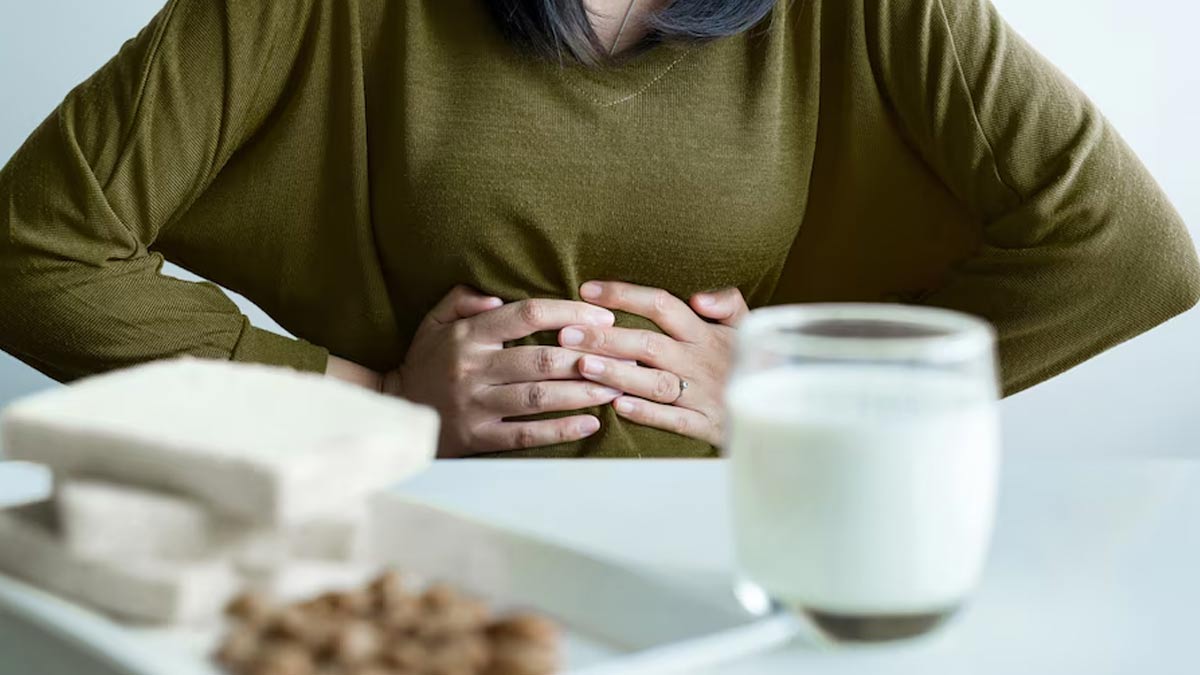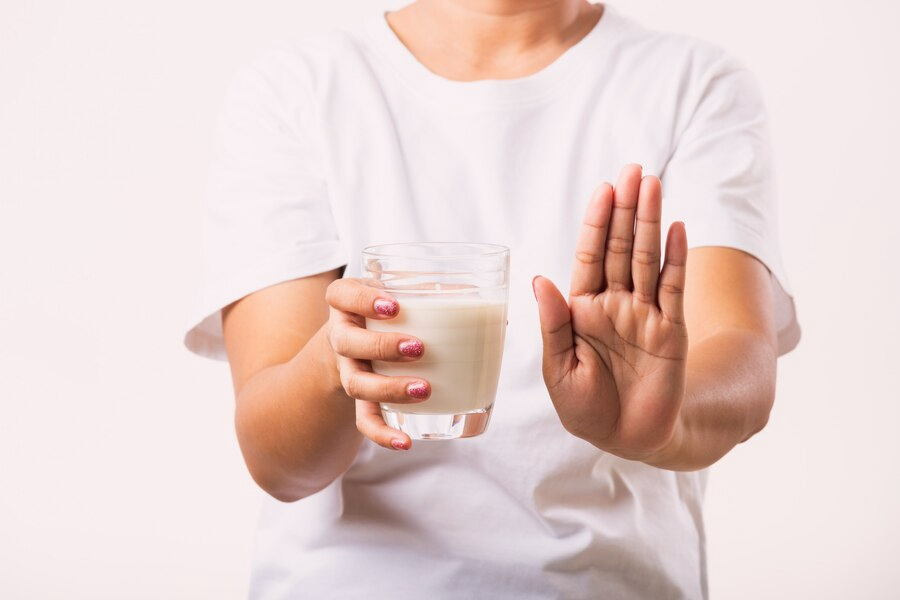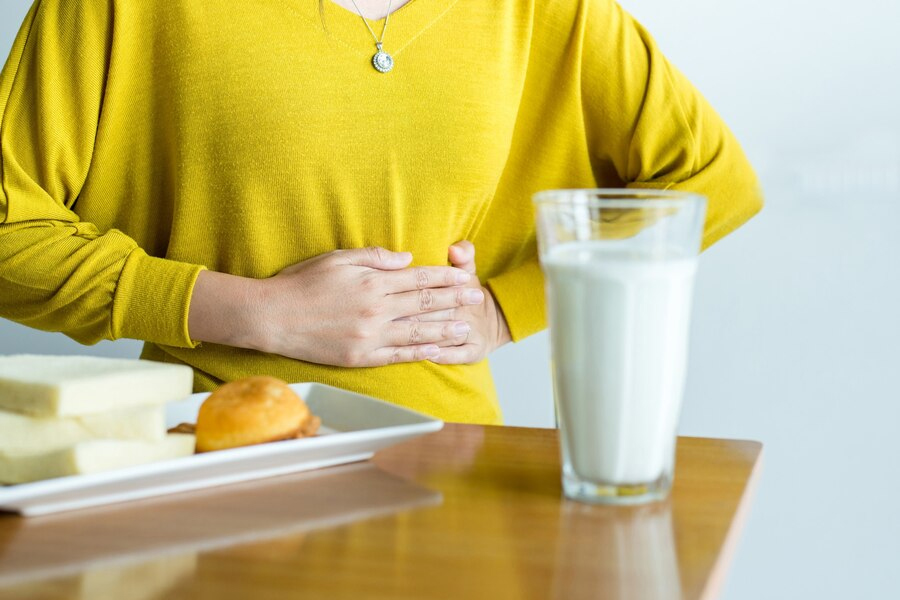
Dairy products, like milk, ghee, butter, and curd, are essentials in every Indian household. Not a lot of people have tea without milk, nor do they have their paranthas without ghee, butter, or curd. However, too much dairy consumption can backfire in some people. One of the most pressing issues is gastrointestinal problems, in which people often complain of experiencing bloating, abdominal pain, and constipation.
Table of Content:-
In an interaction with the OnlyMyHealth team, Dr Preeti Nagar, Dietitian at Noida International Institute of Medical Sciences (NIIMS) College and Hospital, discusses common gastrointestinal issues associated with dairy products and shares how to safely transition to a dairy-free diet.
Also Read: Low FODMAP Diet For IBS: A Gastroenterologist Shares What You Should Have And Avoid
Common Gastrointestinal Issues Associated With Dairy Intake

Dairy can negatively impact gut health. While it may not be true in every case, some people report experiencing various gastrointestinal issues after dairy consumption.
According to a study published in the journal Nutrients, consuming a high dairy diet can change the composition of the gut microbiome. Researchers fed participants a high-dairy diet and a low-dairy diet for six weeks each and found that the high-dairy diet increased the abundance of certain bacteria while decreasing the abundance of others, leading to constipation in some individuals.
Dr Nagar shares that dairy can affect digestive health, leading to some common gastrointestinal issues. These include:
Lactose intolerance: Inability to digest lactose, leading to bloating, gas, diarrhoea, and abdominal discomfort.
Dairy allergy: Immune response to dairy proteins, causing symptoms like hives, swelling, digestive issues, or anaphylaxis.
Irritable Bowel Syndrome (IBS): Dairy can trigger IBS symptoms such as bloating, cramps, diarrhoea, or constipation.
How To Know If Dairy Is Triggering Stomach Problems?
To identify dairy as an underlying cause of stomach issues, Dr Nagar recommends maintaining a food diary to track symptoms after dairy consumption. She advises that people who face gastrointestinal issues after dairy consumption should follow an elimination diet, which involves temporarily removing dairy from the diet and reintroducing it to help pinpoint the cause of problems.
Moreover, consulting a doctor or a dietitian can also help diagnose the condition through various tests.
Check For Lactose Intolerance Or Dairy Allergy

Lactose intolerance is when a person is unable to digest lactose, a sugar found in milk and milk products, such as cheese, yoghurt, ice cream, and butter. This leads to symptoms such as:
- Bloating
- Gas
- Diarrhoea
- Abdominal pain
- Nausea
Dairy allergy refers to an immune reaction to one or more proteins present in cow's milk. Symptoms include:
- Hives
- Swelling
- Itching
- Wheezing
- Vomiting
- Diarrhoea
- Anaphylaxis, in severe cases
Also Read: Choosing Heart-Healthy Dairy: Expert Lists Down What to Eat And Avoid
How To Transition Towards A Dairy-Free Diet

If you are someone who is looking to eliminate dairy from their diet, here are some expert-recommended tips to transition smoothly.
Gradual approach: Slowly reduce dairy intake to allow the body to adjust to alternative sources.
Explore alternatives: Substitute dairy with plant-based milk (almond, soy, coconut), dairy-free yoghurt, cheese, and ice cream.
Read labels: Check food labels for hidden dairy ingredients like whey, casein, or lactose.
Choose nutrients-rich foods: Include calcium-fortified plant-based milk, leafy greens, nuts, seeds, and fortified foods to meet nutritional needs.
If you’re looking for healthy dairy alternatives, you can opt for:
- Fortified plant-based milk (almond, soy), tofu, leafy greens (kale, collard greens), almonds, chia seeds, and sesame seeds.
- Legumes, nuts, seeds, quinoa, lentils, and chickpeas provide protein in a dairy-free diet.
- Sunlight exposure, fortified plant-based milk, mushrooms, and supplements can offer vitamin D.
Final Word
Dr Nagar says, “Understanding the signs of lactose intolerance, dairy allergy, or other gastrointestinal issues related to dairy consumption is crucial for managing digestive health. By identifying triggers, exploring dairy-free alternatives, and seeking guidance from healthcare professionals, individuals can transition to a dairy-free diet effectively while supporting their digestive well-being.”
She concludes by emphasising the need to listen to your body, monitor symptoms, and make informed dietary choices for optimal gastrointestinal health.
Also watch this video
Read Next
Omega-3, Omega-6 and Omega-9 Triangle: How These Fatty Acids Work Together for Optimal Health
How we keep this article up to date:
We work with experts and keep a close eye on the latest in health and wellness. Whenever there is a new research or helpful information, we update our articles with accurate and useful advice.
Current Version
